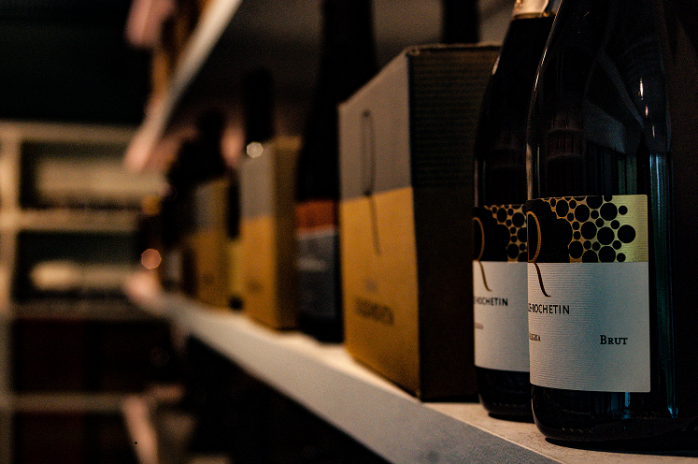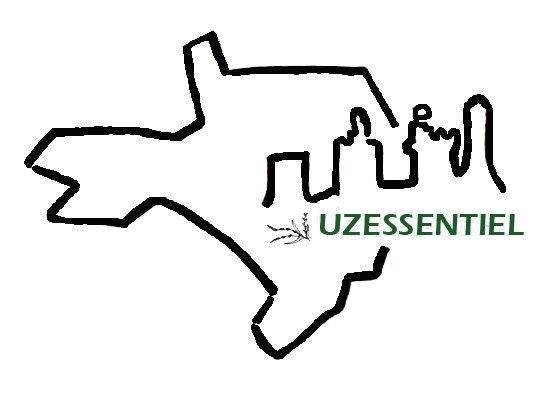Domaine Deleuze-Rochetin, and its organic wines
- Par nbesse
- Le 01/11/2022
- Dans Local products & recipes
With its roots streching back to 1820, the Domaine Deleuze-Rochetin vinyard has been producing organic wines since 2009.

"After having belonged to the Barjeton Durfort family from the Middle Ages to the beginning of the 19th century, the estate was taken over by the Deleuze-Rochetin family in 1820" (Domaine Deleuze-Rochetin)
Extending over a 22 hectare estate, the Deleuze-Rochetin vinyard is growing its vine according to organic farming. A successful bet, amply rewarded.
VISIT
 UzEssentiel editor visited the vinyard to discover the secrets behind the elaboration of the Saba, Sarrazine, Harmattan wines...
UzEssentiel editor visited the vinyard to discover the secrets behind the elaboration of the Saba, Sarrazine, Harmattan wines...
Hello Mathea,
Can you present us the estate of today, and its main differences with the family estate before 2009?
The estate's vines stretch from Blauzac to Arpaillargues and up to Bourdic, covering some 22 hectares.
Despite the change of ownership last August, the estate keeps the family spirit, the essence of the historic vineyard, while bringing a new dynamic. We are currently thinking about the concept of wine tourism and international exports too.
As for the estate's team, it is still the same, and it is a guarantee of quality. We therefore find Baptiste Cartier, our winemaker, François Serret, the cellarman and myself, in charge of reception and marketing.
You have been going organic for over 13 years now. What are the main challenges of this culture?
The previous owners, Catherine and Jean-Michel Cathonnet, came from a long line of winegrowers, spanning over 8 generations.
It is to them that we owe the success of the 100% organic production, meaning freeing ourselves from all phyto products, handling the wines, and doing a gentle filtration without sulphite, etc. A real challenge.
Ecocert? A rigorous process that consists of evaluating, in an independent and impartial manner, the conformity of a product, service or system according to environmental and social requirements specified in a specification or standard. At the end of the certification process, Ecocert issues a written assurance called a certificate or attestation"...
It also has "27 international offices"... and "an international network... in more than 130 countries in order to verify on the ground the conformity of practices with the organic specifications. The entire production chain is audited, from the raw material to the finished product. Ecocert carries out field visits at least once a year, supplemented by unannounced audits during the year... (Ecocert.com)
In France, there are several organic regulations, or labels: among these the Demeter biodynamic cultivation, the Organic Agriculture (AB), but also the High Environmental Value (HVE). What makes ECOCERT, which certifies your estate, different?
ECOCERT is extremely demanding, with a more rigorous control, an inspection every 6 months with soil samples, the possibility of buying the wine in the cellar for testing, etc.
For us, organic culture is mainly an ethical choice. We always keep the same grape varieties, that we treat with essential oils, clay..., to improve the healing of grapes stained by frost... Our vines are protected by Bordeaux mixture and sulphur, used preventively, and in very low doses.

Your new winery preceded your switch to organic farming. Built in 2006, how is it different from the old one?
Our cellar, combining modernity and traditional materials such as wood, welcomes our visitors at the entrance of the village of Arpaillargues. It was built by architect François Privat, to whom we owe in 2017 the new sports hall of the Jean-Louis Trintignant college in Uzès, amongst other projects.
With its very contemporary look, it brings an air of youth into the Domaine that is more than a hundred years old, while meeting all the criteria expected of modern facilities.
What are the specific characteristics of your hillsides? Stony soil, combining limestone and clay, proximity of trees...
Our soils are mainly clay-limestone, which is perfectly suited to your grape varieties. Thanks to the unique properties of this soil, our wines acquire their very own personality.
"The Duché d'Uzès PDO: The Duché d'Uzès appellation area covers 307 hectares, 77 communes and is available in three colours: red, white and rosé.
The average yield is 34 hectolitres/hectare.
To the west, the Duchy of Uzès is bordered by the foothills of the Cévennes, to the east by the town of Uzès,
and then it extends to the limestone plateaux of the Rhône Valley".
 How do you come up with the names of your collections? Sarrazine (2016, Duché d'Uzès PDO), with notes of "cooked black fruits, spices, thyme and dry herbs", Héritage du Levant (2017, IGP Pays d'Oc), with notes of "jammy red and black fruits, sweet spices, slightly smoky liquorice", Arpillus (2020), with notes of "peach, pineapple and exotic fruits"....
How do you come up with the names of your collections? Sarrazine (2016, Duché d'Uzès PDO), with notes of "cooked black fruits, spices, thyme and dry herbs", Héritage du Levant (2017, IGP Pays d'Oc), with notes of "jammy red and black fruits, sweet spices, slightly smoky liquorice", Arpillus (2020), with notes of "peach, pineapple and exotic fruits"....
Each wine recalls the history of Deleuze-Rochetin family. The Elzéar is named after one of the ancestors of the owners of the land, the Arpillus owes its name to a Roman general, the Saba, the Sorcerer with its "smoky notes (specific to the terroirs of the Domaine Deleuze-Rochetin) and acidic citrus" or the Bohème refer to a family of gypsies who, after having worked in the vineyards of the estate, settled in Arpaillargues.
The Harmattan, a white wine whose "smoky, iodine aromas combine with notes of white fruit and flowers" can be considered the signature wine of the Domaine, while the 1820 clearly refers to the birth date of the Deleuze-Rochetin estate. Made with dried grapes that are particularly concentrated in sugar, this wine "harmoniously combines notes of jammy red fruit, orange peel and quince paste". Finishing its ageing in barrel, the 1820 is a meticulous blend with an old cuvée, using the solera method (like for the Port wine, the Sherry or the Marsala), of which we produce about 700 bottles a year.
And then there is the Alegria sparkling wine, "with its fine bubbles and aromas of citrus fruit and roasted hazelnuts"... How does it complement your wine collection?
Alegria is a sparkling wine that can be described as festive and delicate. Produced with our Chardonnay and Sauvignon plots, it is prepared in our cellar and then sent to a partner who completes its elaboration using the famous Champagne method. Its beautiful golden colour and elegant taste makes it the perfect guest for any party.
 Good to know : The Harmattan 2020 and Sarrazine 2016, Duché d'Uzès PDO were awarded the silver medal at the Decanter World Wine Awards.
Good to know : The Harmattan 2020 and Sarrazine 2016, Duché d'Uzès PDO were awarded the silver medal at the Decanter World Wine Awards.
Many thanks to Christophe Deldycke and Mathea Koch, marketing manager, for their collaboration on this article.
The right address: Domaine Deleuze-Rochetin, 20 Chemin du Moulin, 30700 Arpaillargues, www.deleuzerochetin.com/. Cellar open Monday to Saturday, 9.30am to 12.30pm and 2.30pm to 6.30pm. Tel: 04 66 59 65 27.
Photos: chai©deleuze-rochetin, wines©pay attention to details.





